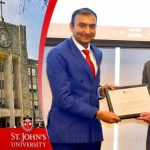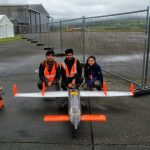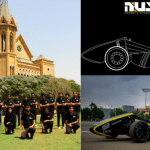An engineering team from Heriot-Watt University has won a cash prize and a national 2022 James Dyson Award for inventing a new system to tackle bushfires.
Five students from India, Bangladesh, Pakistan and Egypt who are studying at Heriot-Watt’s Dubai campus in the United Arab Emirates designed a system called “FireOut” after being horrified by devastating wildfires in countries like Australia.
“The 2019-2020 bushfires caused tremendous damage,” the Heriot-Watt students said in a joint statement. “This motivated us to develop a system capable of detecting and controlling fires at early stages.”
All the judges credited how the students identified a pressing current day problem and designed a potential solution.
Dr. Suaad Al Shamsi
Karachi University PhD students win ISN travel awards for the ASPN meeting
The team noted that regions that suffer from bushfires in the dry season tend to receive heavy rainfall in the wet season, so they designed a rainwater storage system. Using sensor cameras and a communications system, their invention can automatically start bringing fires under control before the first responders arrive – saving time, life and land. Once the fire is brought under control, the pumps can be closed, ready for the storage towers to collect rainwater again.
Existing technologies only detect wildfires and wait for the first responders to arrive. The firefighters often only have a limited water supply, which can result in the fire burning longer.
The “FireOut” team won the equivalent of £5,000 in their local currency as winners of the UAE National prize in the 2022 James Dyson Award. The competition is an annual student design competition run in different countries around the world by the charity of billionaire British inventor and industrial designer, James Dyson.
The award, which opened for entries in March, challenges young people “to design something that solves a problem.”
KP Student develops Mars soil simulant for his Astrobiology research
The prize money can be used towards the next development phase of the team’s invention.
Dr. Suaad Al Shamsi, the UAE’s first female Emirati aircraft engineer and one of the local James Dyson Award judges, said: “We were fascinated by the FireOut invention. All the judges credited how the students identified a pressing current day problem and designed a potential solution.”
The team members are Tasneem Nawar, a fourth-year chemical engineering student from Egypt; Eman Rashid, a fourth-year mechanical and energy engineering student from Pakistan; Zahid Rehman, a fourth-year automotive engineering student from Bangladesh; Deenah Sabaahat, a third-year electrical and electronic engineering student and Zahrah Tungekar, a fourth-year mechanical engineering student – both from India. The group said it was exciting to see how the project made their different specialities come together seamlessly.
Opened in 2005 with 120 students, Heriot-Watt’s Dubai campus now has nearly 4,000 students from around 90 countries, including India, Pakistan, Russia, Egypt, Kazakhstan and Nigeria. Heriot-Watt Dubai is one of five Heriot-Watt campuses. The other four are in Edinburgh, the Scottish Borders, Orkney and Malaysia. More than 27,000 students from 160 countries are studying at Heriot-Watt.
Erasmus Mundus Scholarship 2023, Fully funded opportunity to study in Europe
![]()





